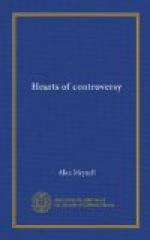But no laxity is ever, I think, to be found in her brief passages of landscape. “The keen, still cold of the morning was succeeded, later in the day, by a sharp breathing from the Russian wastes; the cold zone sighed over the temperate zone and froze it fast.” “Not till the destroying angel of tempest had achieved his perfect work would he fold the wings whose waft was thunder, the tremor of whose plumes was storm.” “The night is not calm: the equinox still struggles in its storms. The wild rains of the day are abated: the great single cloud disappears and rolls away from Heaven, not passing and leaving a sea all sapphire, but tossed buoyant before a continued, long-sounding, high-rushing moonlight tempest. . . No Endymion will watch for his goddess to-night: there are no flocks on the mountains.” See, too, this ocean: “The sway of the whole Great Deep above a herd of whales rushing through the livid and liquid thunder down from the frozen zone.” And this promise of the visionary Shirley: “I am to be walking by myself on deck, rather late of an August evening, watching and being watched by a full harvest moon: something is to rise white on the surface of the sea, over which that moon mounts silent, and hangs glorious. . . I think I hear it cry with an articulate voice. . . I show you an image fair as alabaster emerging from the dim wave.”
Charlotte Bronte knew well the experience of dreams. She seems to have undergone the inevitable dream of mourners—the human dream of the Labyrinth, shall I call it? the uncertain spiritual journey in search of the waiting and sequestered dead, which is the obscure subject of the “Eurydice” of Coventry Patmore’s Odes. There is the lately dead, in exile, remote, betrayed, foreign, indifferent, sad, forsaken by some vague malice or neglect, sought by troubled love astray.
In Charlotte Bronte’s page there is an autumnal and tempestuous dream. “A nameless experience that had the hue, the mien, the terror, the very tone of a visitation from eternity. . . Suffering brewed in temporal or calculable measure tastes not as this suffering tasted.” Finally, is there any need to cite the passage of Jane Eyre that contains the avowal, the vigil in the garden? Those are not words to be forgotten. Some tell you that a fine style will give you the memory of a scene and not of the recording words that are the author’s means. And others again would have the phrase to be remembered foremost. Here, then, in Jane Eyre, are both memories equal. The night is perceived, the phrase is an experience; both have their place in the reader’s irrevocable past. “Custom intervened between me and what I naturally and inevitably loved.” “Jane, do you hear that nightingale singing in the wood?” “A waft of wind came sweeping down the laurel walk, and trembled through the boughs of the chestnut; it wandered away to an infinite distance. . . The nightingale’s voice was then the only voice of the hour; in listening I again wept.”




